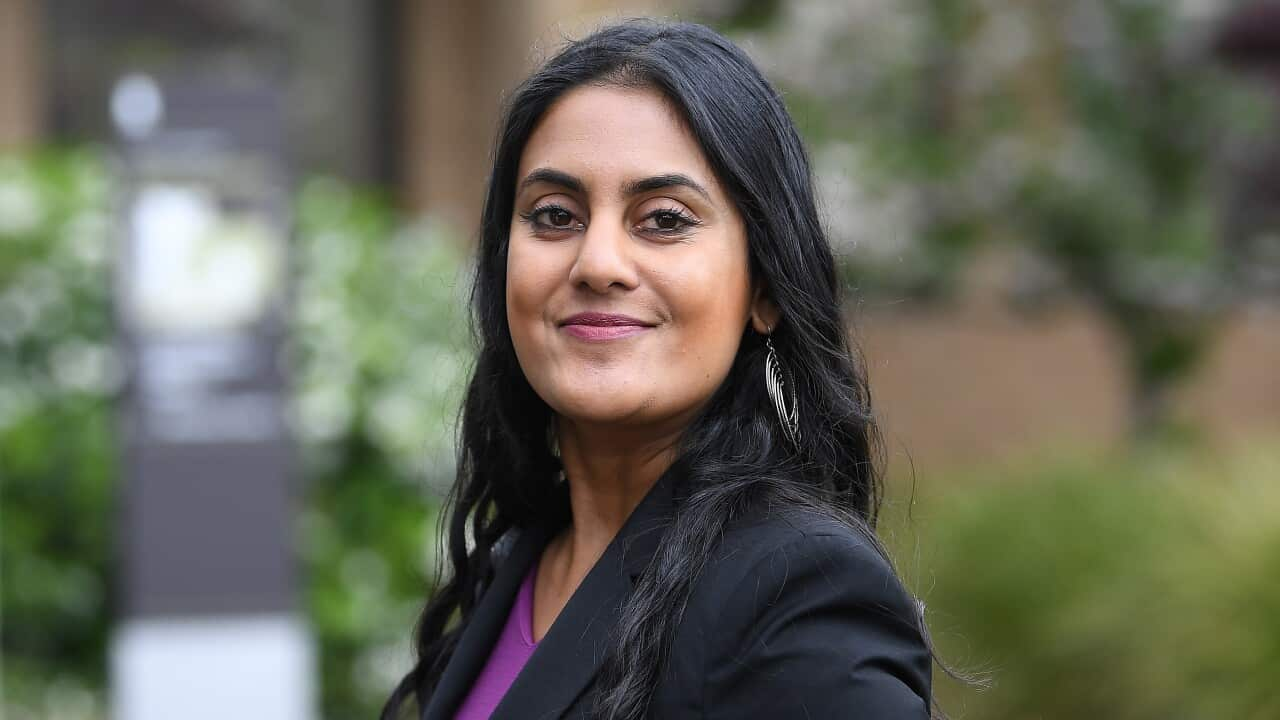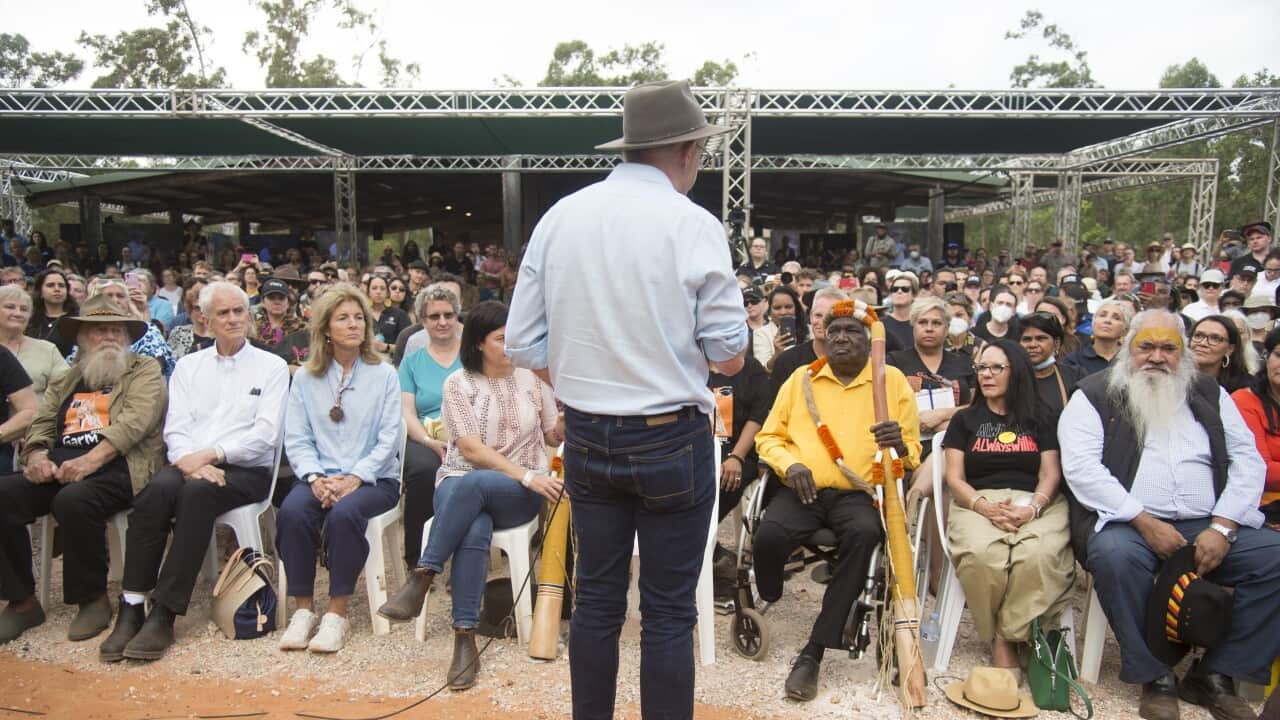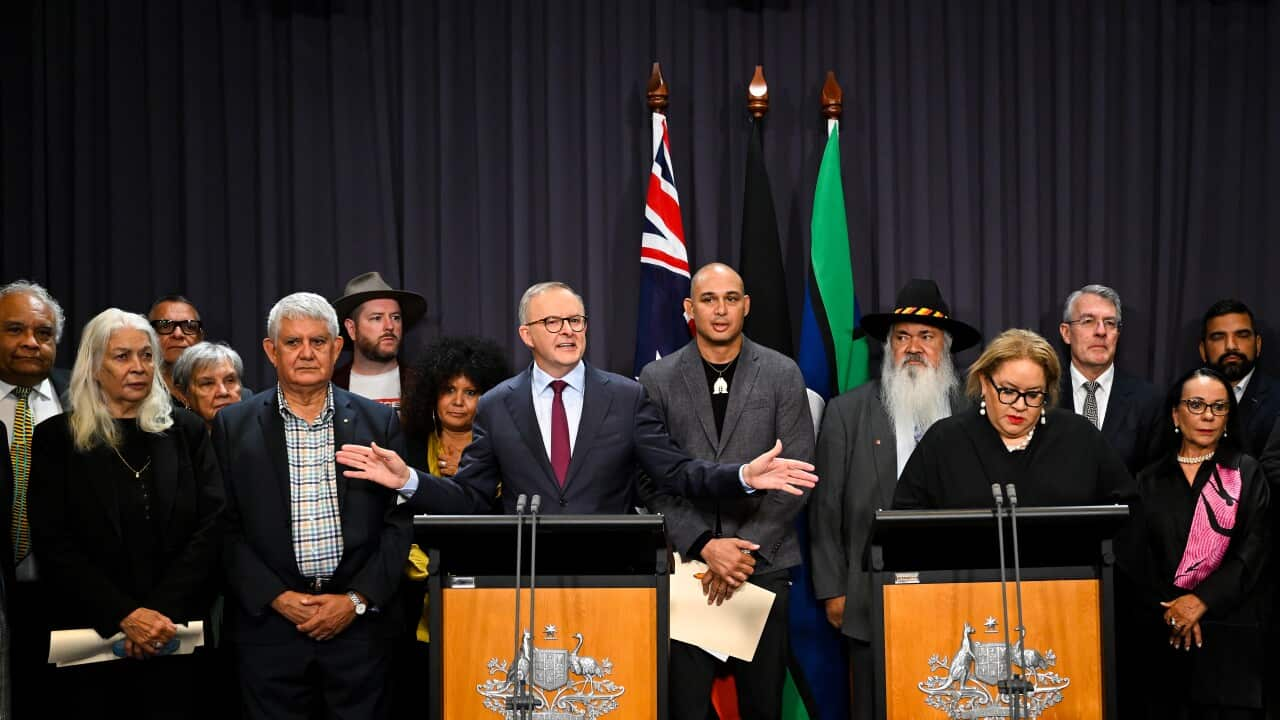Key Points
- More than 110 migrant and cultural community organisations are supporting the Yes campaign for the Voice Referendum.
- Australians will vote on a First Nations Voice to Parliament this year.
- It will be Australia's first referendum since 1999.
More than 110 migrant and cultural community organisations have united in declaring their support for the Voice to Parliament referendum.
The groups have signed a joint resolution asking all Australians to work together to ensure the referendum's success.
Constitutional lawyer Shireen Morris from the Radical Centre Reform Lab at Macquarie University Law School helped organise the joint resolution.
Ms Morris told SBS News polls show those who speak another language at home are more likely to support the referendum.
She said this shows there's plenty of goodwill for the Yes campaign amongst Australians of diverse ethnic backgrounds.
"This is our chance to give back to Indigenous people who've given up so much throughout Australian history, and I think that's why a lot of migrants do feel a deep sense of empathy for the plight of Indigenous people," she said.
Director for Community Engagement at the Chinese Community Council of Australia Diana Lin said the Voice referendum presents an opportunity for diverse Australian communities to unite.
"Let's all stand in solidarity with our First Nations people. Listen to their cries from their hearts, support a First Nations Voice to Parliament and work together with all community to build a harmonious and prosperous country for all," she said.
Ms Lin said the Voice referendum marks an important step towards addressing historical injustices experienced by First Nations people in Australia.
"As Chinese in Australia, we feel privileged and are grateful to call this country home," she said.
"As a nation, we Australians have a rare opportunity to address this historical injustice and heal the wounds and the hurt of our country through the upcoming First Nations Voice referendum."
'Great opportunity as a nation to come together'
President of the United Indian Associations, Dr Sunil Vyas, said Australia has been a world leader in social progress and that this issue is a chance for Australia to be so again.
"Being a pioneer in that respect, we should maintain that tradition. And I believe in recent years we've actually lost some of the way in that respect," he said.
"Compare ourselves with New Zealand - how they treat their First Nations and Indigenous people as well."
Dr Vyas said the referendum is a great opportunity "for us as a nation to get together ... all cultures ... local ... people born here ... young ... old ... new migrants ... all migrants".
Opposition to the Voice
Some migrant and cultural groups are opposing the Voice referendum.
Jamal Daoud has started the Multicultural Voices Against the Voice group and was a candidate for the United Australia Party at the 2022 federal election.
He supports constitutional recognition of Indigenous people but says the Voice should be a legislated body and not enshrined in the constitution.
He believes the Voice could have overreach over every government decision if added to the constitution, even though Prime Minister Anthony Albanese and Indigenous leaders say this isn't the case.
"This change in the Constitution could open things to abuse by the government of the day," Mr Daoud said.
"At the moment, it is the Labor government. In the future, we don't know what will happen with the Liberal government, whether the Liberal government could use it to close our borders tomorrow from migrants or refugees under the pretext of the Voice, and it will say the Voice advised us to do this or the Voice put recommendations."
Mr Daoud added if the Voice is successful, other minority groups will also call for an advisory body.
Chinese-Australian Steve Khouw also holds the same view.
He believes that while constitutional recognition is needed for Aboriginal and Torres Strait Islander people, enshrining the Voice to Parliament will further divide the society.
"I don't want to make the Voice a racial issue, but it is, fundamentally it is because we're talking about one particular race, First Nations, who have a certain privilege or certain, you know, recognition beyond the Chinese community. And we all come down to Australia really to escape that kind of discrimination or, at worst, racism that we had to put up with on a daily basis," Mr Khouw said.
Indigenous lawyer and veteran activist Michael Mansell from Tasmania is another opponent.
He said the Voice doesn't offer genuine empowerment because it can't deliver services, raise revenue, make laws, or deliver finances or land.
Ms Morris said Michael Mansell is a critic because the Voice is not radical enough for his liking.
She said it amounts to a modest yet profound reform.
"(Michael Mansell) is right in the sense that it is not a silver bullet, it doesn't completely overturn and flip the power relationship between Indigenous Australians and Australian governments, but it is an important, profound, modest yet profound reform to that power relationship."
The Federal Opposition's Indigenous Affairs spokesperson, Jacinta Nampijinpa Price, who is herself Indigenous, is opposed to the Voice, saying there is still not enough known about the proposal's details.
For the Voice referendum to succeed, it needs to be approved by a majority of voters in a majority of states.
History shows they usually fail in the absence of bipartisan support for a referendum proposal in Australia.
With Opposition leader Peter Dutton opposing the Voice, the Yes campaign has a more challenging task.














